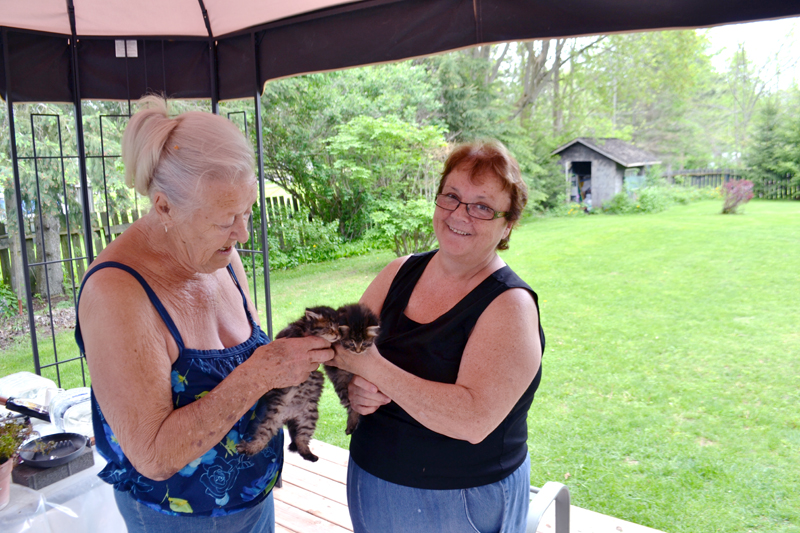Picture purrrrfect
Morewood residents and stray cat advocates, Marie Cousineau and Debbie Courneyea hold the approximately six-week-old stray kittens that are currently being fostered by Cousineau. The kittens will stay at her home in Morewood for a short time until they can be spayed or neutered and later put up for adoption. Cousineau and Courneyea also help to get the kittens accustomed to humans. Sawyer Helmer photo
Kalynn Sawyer Helmer
Record Staff
MOREWOOD – Debbie Courneyea has been saving the lives of stray and feral cats for years. It started when she found a young stray near her home. When she brought it to the Humane Society, they were so overrun with cats that they could not even guarantee a vet check before considering a put down option. This was no fault of the Humane Society’s but of the constant lack of responsibility taken by some pet owners, explained Courneyea.
Owning a pet is a lot of work, especially when adopting a stray or feral cat. When owners find they cannot handle the responsibility of rehabilitating one of these animals, they are often “dropped off at barns or left behind to be some else’s responsibility. And that’s not fair,” said Courneyea. While many barns are no longer milking, the cats that get dropped off are now going hungry, “but people just see a barn, [assume] and drop them off,” she added.
The feral cat situation around Morewood and other rural communities comes down to two main issues, believes Courneyea. The first may be the most important– the lack of spaying and neutering. “If you get a cat, get it fixed,” exclaimed Courneyea. Unfortunately getting a cat fixed can be expensive and the drive to Ottawa for a special at-cost or reduced price clinic is not always seen as worth it.
This is why Courneyea wants to see more local vets providing options to help reduce the amount of feral cats. She suggests the idea of a one day clinic a few times a year where local vets gather together to provide at-cost operations. Courneyea currently works with Ottawa-based vet Dr. Katie Jones, but one vet is not enough for the multitude of feral cats. In order to begin managing the problem, Courneyea believes spay and neuterings need to become more accessible.
The second issue Courneyea spoke about was the lack of knowledge and understanding when adopting a feral cat. There is a lot more to pet ownership than meets the eye. For starters Courneyea said she sees advertisements for free kittens often, but this can be detrimental. A free kitten might seem like a great deal but there are costs to consider before making the final decision. Cat litter, food, toys and grooming are all high regular costs that are mandatory for a healthy animal. However, the potential medical costs have to be considered as well. Unexpected vet bills can be a shock and any potential owner should evaluate whether they are ready to take that risk before bringing a cat home, said Courneyea.
Feral kittens and cats are usually not the cuddly pet that owners desire. Adopting one of these animals takes patience and understanding of the challenges ahead. Fortunately, Courneyea and Marie Cousineau are two Morewood residents who volunteer their time to make adopting feral cats easier. Courneyea no longer fosters cat or kittens, but once was the home of 16 cats that she generously saved, she is now down to one cat, Patches, and two small dogs. Courneyea volunteers her time by helping to catch and deliver feral cats to the Ottawa Stray Cat Rescue and then to the foster homes around the Ottawa area.
Cousineau volunteers her property as a foster home for feral cats to help expose them to humans and other animals. She is currently housing three small kittens before they can be fixed and find permanent homes. Cousineau explained that it was about getting kittens young enough to handle, making them more likely to be adopted.
Despite the good work done by Courneyea and Cousineau, a number of cats are being abandoned all the time. “Without volunteers and foster homes, it turns into a vicious cycle,” said Courneyea. The Ottawa Stray Cat Rescue evaluates the incoming animals to determine if they can be rehabilitated. If so, they are fixed and sent to foster homes until adoption. The best homes are ones with other pets to get the cats used to animals and people. If the cats are deemed too feral for adoption, the Rescue sends them to a safe site that is monitored by the volunteers to ensure they are healthy. Courneyea said she would love to see a similar situation happen in the Morewood area. But in order for that to happen there needs to be more volunteers, foster families, and awareness about feral and stray cats.











